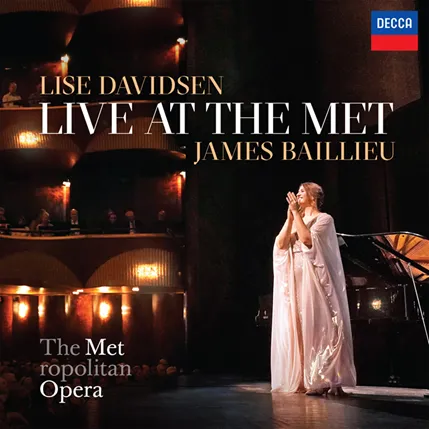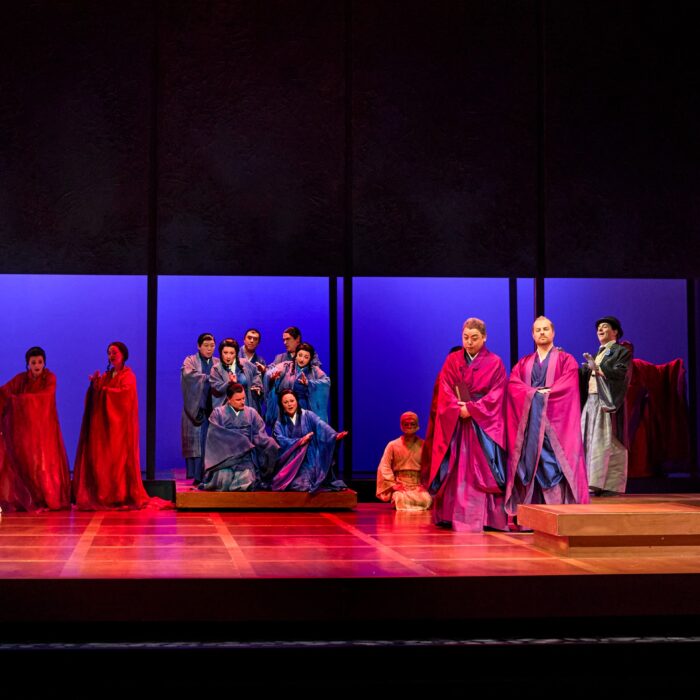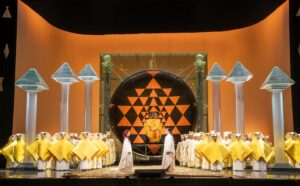
Metropolitan Opera 2024-25 Review: The Magic Flute
Conductor Nimrod David Pfeffer & Stellar Cast Lineup Celebrate Met Opera’s Holiday Presentation
By Jennifer Pyron(Photos: © Met Opera)
This holiday season’s production of Metropolitan Opera’s “The Magic Flute” brings joy and grandiosity to Met Opera’s stage, and audience members of all ages. Julie Taymor’s beloved production is a nostalgic showcase of thoughtful set designs, costume designs, and dancing. This is the abridged, English adapted version of Mozart’s “Die Zauberflöte” designed to run in under two hours, making it possible for most young audience members to enjoy in one sitting – and they did!
Conductor Nimrod David Pfeffer led a remarkable cast of first-class singers, including David Portillo, Will Liverman, Aigul Khismatullina, Hera Hyesang Park, Soloman Howard, Rodell Rosel, Magdalena Kuźma, and more. This particular Holiday Presentation season marks Met Opera’s run of Julie Taymor’s production of over 500 times, inviting us all to remember the magic and beauty in every given moment.
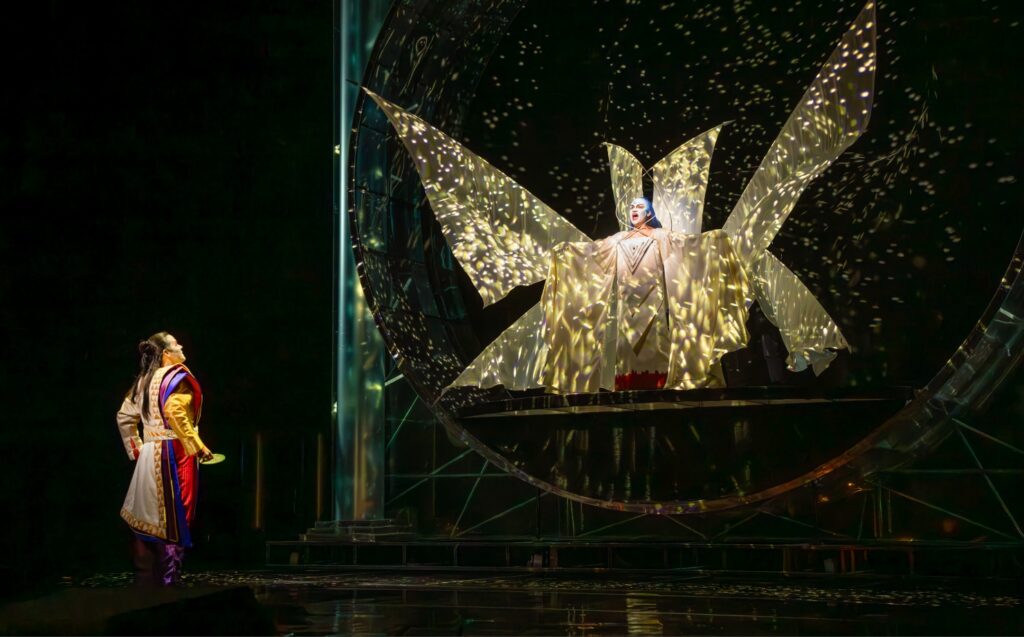
Illuminating Queen of the Night
This year’s production stars sopranos Kathryn Lewek and Aigul Khismatullina as Queen of the Night. Lewek has appeared a record of over 70 times on the Met stage in this role, and last year, OperaWire reviewed her performance.
For this year’s production, OperaWire saw the soprano Aigul Khismatullina, making her Met debut. Khismatullina as Queen of the Night is a masterpiece in the making. At the start of her first aria, “Oh, don’t tremble, my dear son,” Khismatullina established her presence as a scorn-worthy mother suffering on behalf of her daughter who is being held against her will by Monostatos. Her performance was sharp, intuitive, and soul-evoking. Throughout this aria, she developed into something more than expected, taking the reins of this role into her own hands of interpretation and adding dimension through her voice.
I must also mention how delicate and precise conductor Nimrod David Pfeffer was in unison with Khistmatullina’s voice. Together, there was a level of awareness and excitement that blossomed throughout the night, intoxicating listeners of all ages.
In Khistmatullina’s most notable aria, “Hell’s vengeance boils in my heart,” there was a newfound level of grit and power in her voice, yielding a sense of greater understanding surrounding this role. Khismatullina also took her time, allowing her solid vocal technique and breath support to fully manifest her middle-range’s body. Because of this, she seamlessly voiced her upper range with clarity and ease. Khismatullina invited listeners to focus on her expansive palette in moments like this, making her performance feel genuine and transparent in its delivery. Her vocal inflections revealed a new meaning behind this role’s all-powerful presence as her soprano stretched into the hall with magnificent range.
There was also a gem-like quality in her tone that continues to resonate in the back of my mind, even today, making me want to hear more of Khismatullina’s voice in more roles. How she delivered the Queen of the Night’s arias, for me, felt like merely an appetizer of what’s to come in her abundant future. Moments like this are really exciting and I felt like I was observing a diva at the precipice of her breakout.
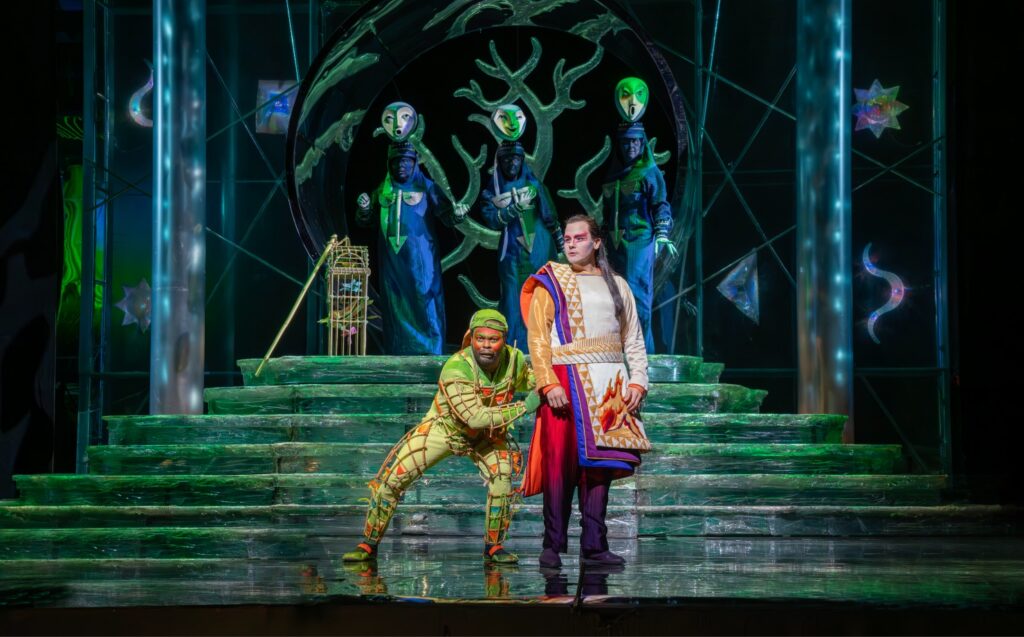
Tamino & Papageno Shine Together
Tenor David Portillo as Tamino and baritone Will Liverman as Papageno were exquisite! The interplay between them as they worked together in this production is something I want to make note of and will always cherish. There was a certain level of camaraderie that made these two seem like long-lost friends, getting the chance to perform together on the Met opera stage. I appreciate how they told this “fantastical” story together, making it more about the value of friendship and how friends can lean on one another during the highs and lows of life. (laughing their way through fear together)
This was also Portillo’s reprisal of the role. His Tamino is refreshing and reinvigorating to experience. Portillo’s voice is crystal clear while singing the English diction, making it possible for young listeners in the audience to follow along. He also exuded grace in his delivery, literally in every note he sang and word he spoke. There were high levels of beauty that he brought to this production through his voice, demeanor, and overall presence. I must also mention that while he elevated this role immensely, never once did he detach from his audience or cast. He stayed right in the mix of it all, having fun and truly enjoying his art and colleagues on stage.
Portillo’s voice, especially as he sang the aria “This image is enchantingly lovely,” sparkled as he spun his warm tenor into the Met’s grand hall. He held Pamina’s image in his hand and admired her beauty while singing in perfect alignment with the orchestra’s beating pulse. Other notable moments of true bliss were when he sang “Pamina? I hear her calling,” leading into his duet with Pamina during “Tamino, mine, welcome at last,” and especially magical was “The fiery furnace could not harm us.” Portillo’s voice was consistently even-toned and articulated. Even during his most physical moments while running about the stage in his adventures with Papageno, Portillo sang from his core and his voice carried in volumes.
Will Liverman’s Papageno was delightful and full of excellent singing as well. In fact, I was often enthralled with his voice’s golden timbre so much, that I forgot he was Papageno. Liverman delivered his best vocally, and then some. I was seated in the audience behind a young listener who teetered on the edge of their seat when Liverman sang, leaning forward in anticipation of his next move. In this simple observation, I can honestly say that young listeners were all about Papageno in this production, and one knows that captivating an audience of young people is the greatest compliment of all.
Will Liverman shared a different perspective than tenor Rolando Villazón, and this is also what stood out to me. Liverman came across as relatable as possible and was unafraid to make mistakes along the way which made him even more real on stage and not just a fantasy character. I felt Liverman toyed with the idea of Papageno never wanting to fit into the mold of his character’s expectations. Instead, Liverman seemed along for the ride, taking delight in the present moment, come what may.
His voice while singing “I’m sure that there could never be” took me back to when I heard him sing live at Alice Tully Hall just last year. Liverman embodies a tone of soulful expression that permeates everything he sings.
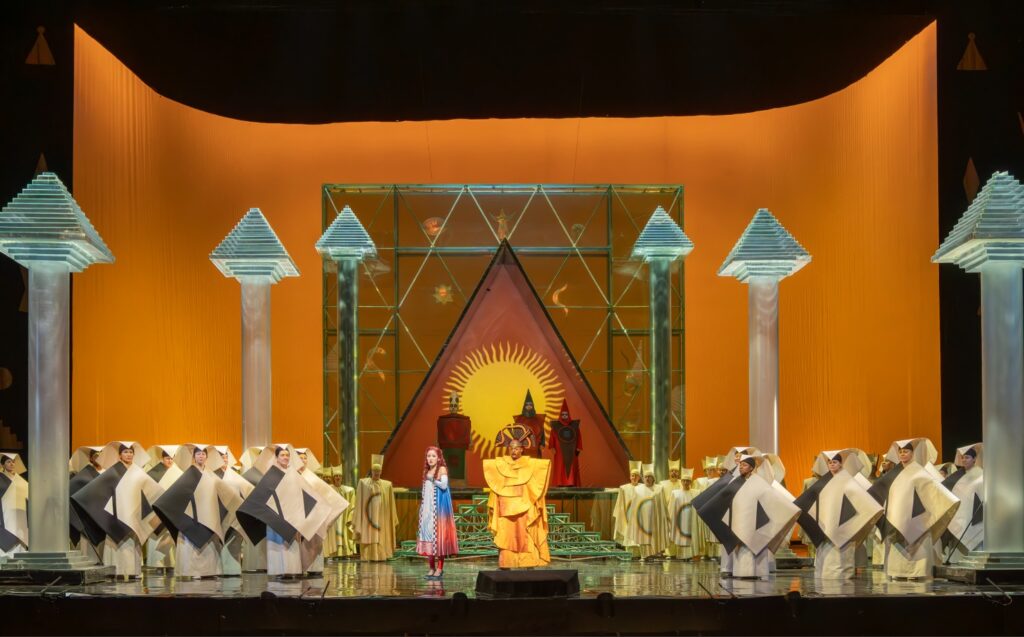
Hera Hyesang Park as Pamina
I’ve waited a long time for the opportunity to experience Hera Hyesang Park performing the role of Pamina in this particular production. Park’s opera career has expanded greatly over the past three years. Her performance with pianist Katelan Trần Terrell at Carnegie Hall in 2023 when the Korean Cultural Center New York & Korea Music Foundation presented “Songs of Her: Hera Hyesang Park” was an intimate showcase of her voice and life story.
In the role of Pamina, Park’s voice sounded brilliant and tender to the emotions of her character who deals with a lot of tragedy before finding (and re-finding) her heart’s true love. Her most famous aria, “Ach, ich füls” (“Ah, I can feel it”), was Park’s spotlight moment of the production as she delivered a beautiful and resplendent tone throughout. Her voice is pure and full of joy in everything she sings, so this felt like a natural role for her in many ways.
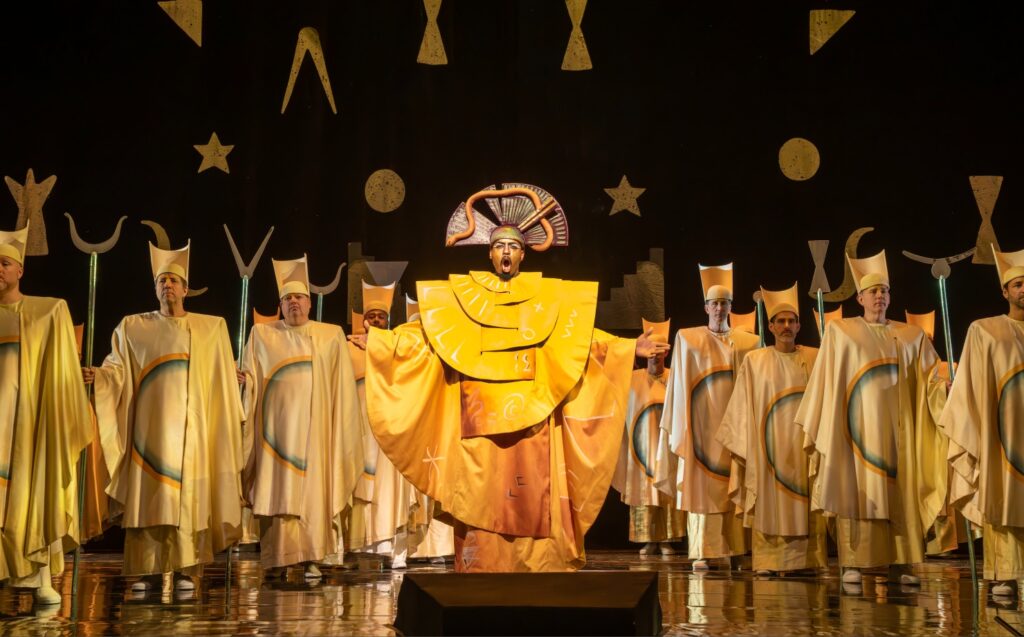
Soloman Howard as Sarastro
The most memorable singer of the night, for me, was bass Soloman Howard. I had yet to experience him live and was absolutely blown away. Howard’s bass is full-bodied, multidimensional, and purely magical. His voice stretched to the back of the Met’s hall and up to the ceiling full of starburst chandeliers. There was no limit to his voice, in fact, and oftentimes when he was singing, it was all I wanted to listen to in the moment. I would love to see him in more roles that support his expansive and commanding voice, including Méphistophélès in Gounod’s “Faust.”
Sarastro’s aria, “O Isis & Osiris,” in Howard’s voice was magnificent. His vocal palette has remarkable depth that brought to life every note he sang. He radiated in the spotlight and I noticed audience members becoming still in their seats, actively listening and observing him. His voice came across as genuine and honest in its delivery too, which made his character feel very real and graceful in his power. Howard’s gentle temperament mixed with his vocal phrasing, made Sarastro stand out from other performances on this night.
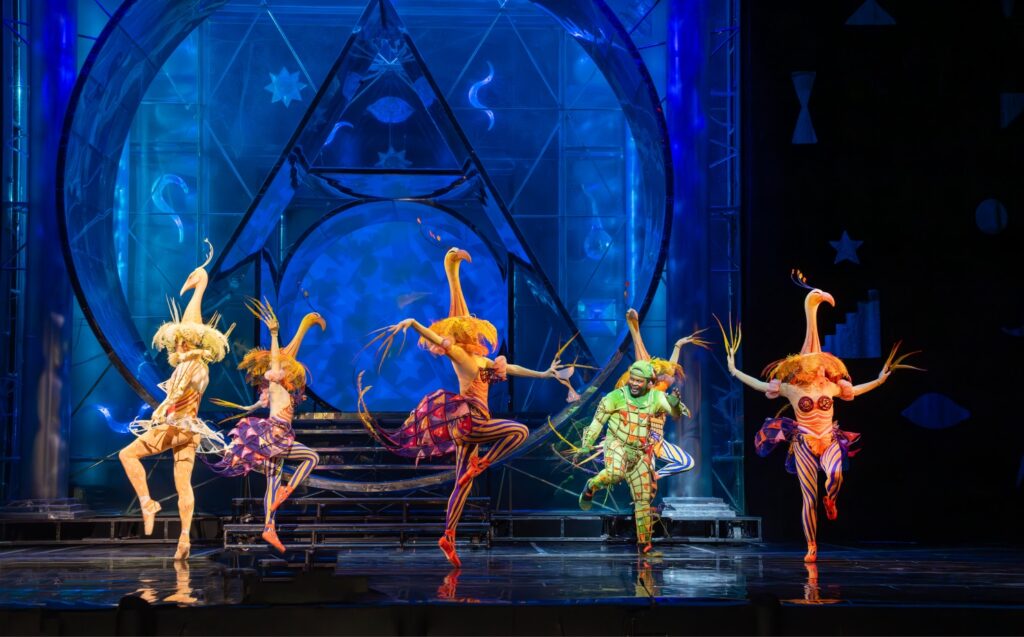
More Cast Highlights
Rodell Rosel as Monostatos gave a classic interpretation of this controversial role. Rosel’s voice sounded precise and agile, especially while running about the stage and determined to steal a kiss from Pamina. His acting was intentionally comical, and off-putting, making Monostatos one of the “villains” of the night. The Three Ladies, including sopranos Caitlin Lynch, Maire Therese Carmack, and Eve Gigliotti, sounded superb as they sang together, reminding Papageno of his conscience along the way. Magdalena Kuźma as Papagena showcased her solid vocal technique and her voice was especially brilliant as the “old woman.”
Other notable roles include Stephen Paynter, Kurt Phinney, and Craig Montgomery as the Attendants, and Robert Stahley and Richard Bernstein as the Guards. Their voices were solid and present in full force, leading into the most comical moments which include the dancing scene when Papageno’s bell box plays and the scenes where the main guard reveals more to Papageno about his Papagena. The young audience members enjoyed any scene that made light of this opera’s underlying complexities.
Nico Hwang, Luka Zylik, and Ori Wosner as the Spirits sounded ethereal as they soared up high upon the stage and sang in unison. William Guanbo Su as the Speaker, and Christopher Job and Scott Scully as the Priests also sounded excellent in their roles.
Solo dancer Maxfield Haynes captivated the whole audience as he was in full flamingo costume, dancing with grace and ease about the stage. The Met Opera Ballet performers really bring Julie Taymor’s costumes, constructed and executed by the Met Opera Costume Department, to life in grandiosity.
The Met Opera Chorus and Orchestra were in full holiday cheer, sounding radiant as ever. Special mention to flute soloist Chelsea Knox for always being in excellent timing and clarity, making this production extra special and joyful with her playing.
The puppets throughout the opera were beautifully nostalgic, constructed by Michael Curry Design, Inc. and Met Opera Shops.
Julie Taymor’s “The Magic Flute” delights audience members of all ages this year, reminding us all of the magic and beauty that awaits in every given moment.

